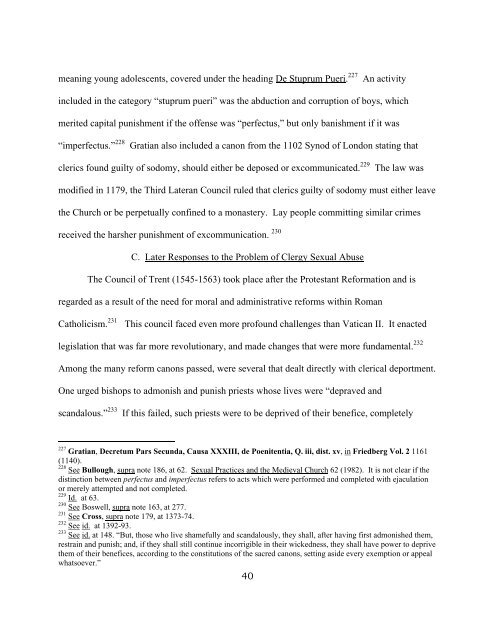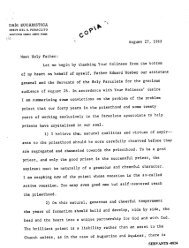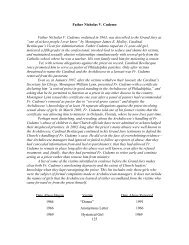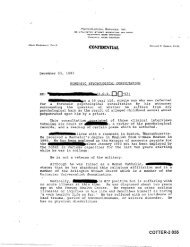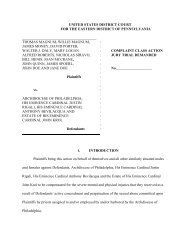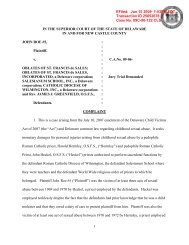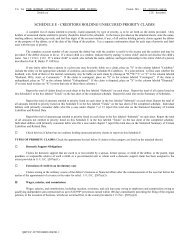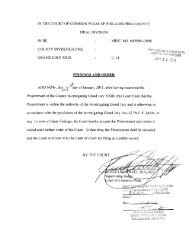1 1 Catholic Clergy Sexual Abuse Meets the Civil Law by Thomas P ...
1 1 Catholic Clergy Sexual Abuse Meets the Civil Law by Thomas P ...
1 1 Catholic Clergy Sexual Abuse Meets the Civil Law by Thomas P ...
Create successful ePaper yourself
Turn your PDF publications into a flip-book with our unique Google optimized e-Paper software.
meaning young adolescents, covered under <strong>the</strong> heading De Stuprum Pueri. 227 An activity<br />
included in <strong>the</strong> category “stuprum pueri” was <strong>the</strong> abduction and corruption of boys, which<br />
merited capital punishment if <strong>the</strong> offense was “perfectus,” but only banishment if it was<br />
“imperfectus.” 228 Gratian also included a canon from <strong>the</strong> 1102 Synod of London stating that<br />
clerics found guilty of sodomy, should ei<strong>the</strong>r be deposed or excommunicated. 229 The law was<br />
modified in 1179, <strong>the</strong> Third Lateran Council ruled that clerics guilty of sodomy must ei<strong>the</strong>r leave<br />
<strong>the</strong> Church or be perpetually confined to a monastery. Lay people committing similar crimes<br />
received <strong>the</strong> harsher punishment of excommunication. 230<br />
C. Later Responses to <strong>the</strong> Problem of <strong>Clergy</strong> <strong>Sexual</strong> <strong>Abuse</strong><br />
The Council of Trent (1545-1563) took place after <strong>the</strong> Protestant Reformation and is<br />
regarded as a result of <strong>the</strong> need for moral and administrative reforms within Roman<br />
<strong>Catholic</strong>ism. 231 This council faced even more profound challenges than Vatican II. It enacted<br />
legislation that was far more revolutionary, and made changes that were more fundamental. 232<br />
Among <strong>the</strong> many reform canons passed, were several that dealt directly with clerical deportment.<br />
One urged bishops to admonish and punish priests whose lives were “depraved and<br />
scandalous.” 233 If this failed, such priests were to be deprived of <strong>the</strong>ir benefice, completely<br />
227<br />
Gratian, Decretum Pars Secunda, Causa XXXIII, de Poenitentia, Q. iii, dist. xv, in Friedberg Vol. 2 1161<br />
(1140).<br />
228<br />
See Bullough, supra note 186, at 62. <strong>Sexual</strong> Practices and <strong>the</strong> Medieval Church 62 (1982). It is not clear if <strong>the</strong><br />
distinction between perfectus and imperfectus refers to acts which were performed and completed with ejaculation<br />
or merely attempted and not completed.<br />
229<br />
Id. at 63.<br />
230<br />
See Boswell, supra note 163, at 277.<br />
231<br />
See Cross, supra note 179, at 1373-74.<br />
232<br />
See id. at 1392-93.<br />
233<br />
See id. at 148. “But, those who live shamefully and scandalously, <strong>the</strong>y shall, after having first admonished <strong>the</strong>m,<br />
restrain and punish; and, if <strong>the</strong>y shall still continue incorrigible in <strong>the</strong>ir wickedness, <strong>the</strong>y shall have power to deprive<br />
<strong>the</strong>m of <strong>the</strong>ir benefices, according to <strong>the</strong> constitutions of <strong>the</strong> sacred canons, setting aside every exemption or appeal<br />
whatsoever.”<br />
40


